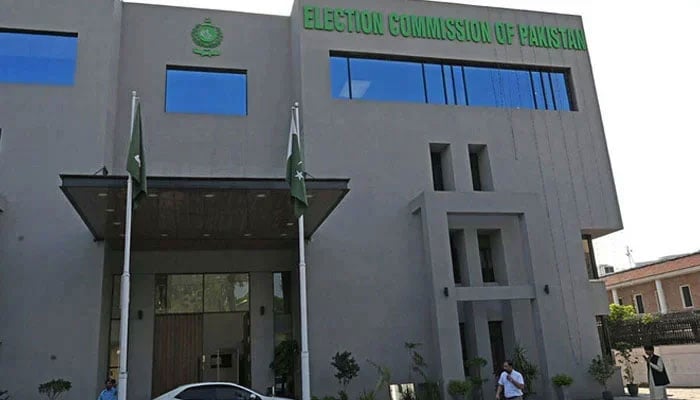ECP controversy
With court scheduled to hear matter again on April 29, inaction of government is becoming increasingly indefensible
The failure of the government to appoint a new Chief Election Commissioner (CEC) and two members of the Election Commission of Pakistan (ECP) is a dereliction of duty that could further erode public trust in the electoral process. Fittingly, the Islamabad High Court (IHC) has now issued pre-admission notices to the federal government, Prime Minister Shehbaz Sharif and President Asif Ali Zardari, questioning the continued delay in these crucial appointments. With the court scheduled to hear the matter again on April 29, the inaction of the government is becoming increasingly indefensible. The tenure of CEC Sikandar Sultan Raja, along with ECP members Nisar Ahmad Durrani and Shah Muhammad Jatoi, ended on January 26. However, under the 26th Amendment, they continue to function until replacements are appointed. While this legal provision prevents a complete institutional vacuum, it does not absolve the government of its responsibility to ensure a timely transition. The fact that no formal process has even begun, despite the 45-day constitutional deadline having passed, is alarming. According to reports, there has been no contact between the prime minister and the leader of the opposition in the National Assembly to initiate consultations on new appointments. This is a reckless disregard for the importance of electoral integrity in an already fractured political landscape.
Pakistan’s elections have long been mired in controversy, but the last two general elections -- 2018 and 2024 -- stand out as particularly contentious. While the Pakistan Tehreek-e-Insaf (PTI) has been vocal in its criticism of Sikandar Sultan Raja's tenure due to alleged irregularities in the 2024 elections, it is worth recalling that the 2018 elections were just as controversial for the Pakistan Muslim League-Nawaz (PML-N). Unfortunately, rather than working towards a system that inspires public confidence, successive governments and opposition parties have treated electoral disputes as mere political tools. The process for appointing the CEC and ECP members is clearly outlined in the constitution. The prime minister and the leader of the opposition are required to consult and agree on nominees before forwarding the names to a parliamentary committee for approval. If they fail to reach a consensus, both sides submit three names each, and the committee makes the final decision. The rules are clear, yet the political will to follow them appears absent.
The reluctance to expedite these appointments suggests that both the government and the opposition are more interested in keeping the ECP leadership in a state of uncertainty rather than ensuring a credible electoral body. This is dangerous. Elections should be instruments of conflict resolution, not catalysts for further discord. If Pakistan’s political elite genuinely care about democracy, they must act now to restore faith in the electoral process. The government must immediately engage with the opposition and finalise names for these critical positions through consensus. The opposition, too, must participate constructively rather than use the delay as another point of political agitation. If the country is to move past the bitter divisions of the last two elections, ensuring a fair, transparent and trusted electoral system should be the foremost priority. Democracy thrives on stability, not controversy. Pakistan truly cannot afford another disputed election.
-
 What You Need To Know About Ischemic Stroke
What You Need To Know About Ischemic Stroke -
 Shocking Reason Behind Type 2 Diabetes Revealed By Scientists
Shocking Reason Behind Type 2 Diabetes Revealed By Scientists -
 SpaceX Cleared For NASA Crew-12 Launch After Falcon 9 Review
SpaceX Cleared For NASA Crew-12 Launch After Falcon 9 Review -
 Meghan Markle Gives Old Hollywood Vibes In New Photos At Glitzy Event
Meghan Markle Gives Old Hollywood Vibes In New Photos At Glitzy Event -
 Simple 'finger Test' Unveils Lung Cancer Diagnosis
Simple 'finger Test' Unveils Lung Cancer Diagnosis -
 Groundbreaking Treatment For Sepsis Emerges In New Study
Groundbreaking Treatment For Sepsis Emerges In New Study -
 Roblox Blocked In Egypt Sparks Debate Over Child Safety And Digital Access
Roblox Blocked In Egypt Sparks Debate Over Child Safety And Digital Access -
 Savannah Guthrie Addresses Ransom Demands Made By Her Mother Nancy's Kidnappers
Savannah Guthrie Addresses Ransom Demands Made By Her Mother Nancy's Kidnappers -
 OpenAI Reportedly Working On AI-powered Earbuds As First Hardware Product
OpenAI Reportedly Working On AI-powered Earbuds As First Hardware Product -
 Andrew, Sarah Ferguson Refuse King Charles Request: 'Raising Eyebrows Inside Palace'
Andrew, Sarah Ferguson Refuse King Charles Request: 'Raising Eyebrows Inside Palace' -
 Adam Sandler Reveals How Tom Cruise Introduced Him To Paul Thomas Anderson
Adam Sandler Reveals How Tom Cruise Introduced Him To Paul Thomas Anderson -
 Washington Post CEO William Lewis Resigns After Sweeping Layoffs
Washington Post CEO William Lewis Resigns After Sweeping Layoffs -
 North Korea To Hold 9th Workers’ Party Congress In Late February
North Korea To Hold 9th Workers’ Party Congress In Late February -
 All You Need To Know Guide To Rosacea
All You Need To Know Guide To Rosacea -
 Princess Diana's Brother 'handed Over' Althorp House To Marion And Her Family
Princess Diana's Brother 'handed Over' Althorp House To Marion And Her Family -
 Trump Mobile T1 Phone Resurfaces With New Specs, Higher Price
Trump Mobile T1 Phone Resurfaces With New Specs, Higher Price




